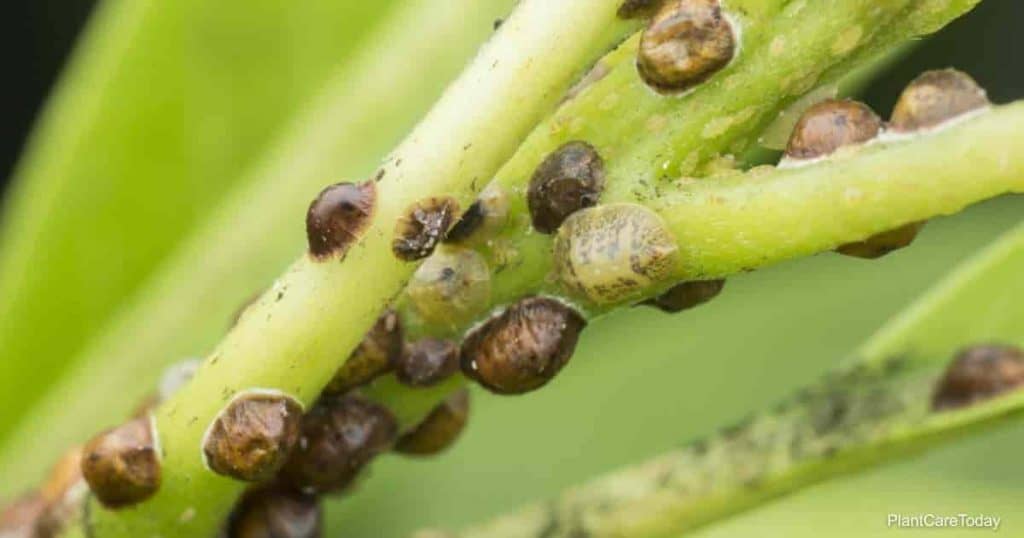While taking a stroll in your garden, you may come across a cotton-like formation on your plants’ leaves, twigs, and stems.
This is a likely sign of an insect infestation called soft scale, caused by insects feeding off plant sap.

Kill soft scale with either a pesticide or non-pesticide method. But before we get there, you should know what soft scale is and the damage it causes.
What Is A Soft Scale Infestation?
The scientific family for soft scale insects is Coccidea. These plant scale pests feed off plant sap.
Understanding these damaging insects is vital to determining the course of treatment.
Soft scale insects often have a protective covering or a waxy covering.
Common types of soft scales found in America are:
Indian Wax scale
This is one of the most common types and it attacks holly, barberry, cherry laurel, and boxwood. Many other plants also fall prey to this insect pest.
Wax scales are white, cream, pink, or gray and 3mm-8mm in diameter.
Lecanium scale
The Oak Lecanium scale grows on various oak species, mainly targeting the willow oak.
European Fruit Lecanium infects deciduous trees such as elm, redbud, dogwood, maples. They are brown and convex and most noticeable in spring. Their ovisac (an egg-containing capsule) measures 2mm-4 mm across.
Cottony Maple Leaf Scale
This scale’s primary target is Maplewoods, but it also attacks dogwoods.
The ovisac size of these soft scales ranges from 3mm-6 mm. The brown adult female dies and remains at one end of the ovisac and there is one generation per year.
Tulip Tree Scale
This is a severe pest infesting Tulip trees and magnolias. The females give live birth to crawlers in the summer who settle on the twigs.
Tulip tree scales often cover the infested trees with sooty mold. In severe cases, it may lead to the death of the tree.
What Damage Do Soft Scales Cause?
Soft scales have devastating effects on ornamental plants. Heavy infestations can even kill trees.
The damage can be irreversible if not addressed quickly. In targeting plant fluids soft scales:
- Extract fluids from the phloem
- Reduce plant growth
- Cause leaf drop or branch dieback
An early and common symptom is the amounts of honeydew and sooty mold fungus on or beneath host plants.
Scales are common on plants and trees already suffering physical damage brought on by drought, heat, or improper planting.
Protect your plants and vegetation from the drastic effects of soft scales by giving your gardens proper care and management.
How To Control Soft Scales?
Scouting and monitoring is the best way to ensure a pest-free garden. Be extra watchful if you have plants susceptible to soft scales, such as citrus plants.
NOTE: Soft scales and Armored scales are the most common types of scales.
If an infestation begins, start treatment with a non-pesticide control method. This will not harm any non-target species.
If the infestation is persistent, use chemical pesticides labeled to control the infestation.
If you go the pesticide route, use the pesticides with shorter treatment cycles. This will cause less damage to local wildlife.
Non-Pesticide Methods
- If the rate of infection is not extensive, try to remove the insects by hand.
- Scale insects, once established, are difficult to end. Consider removing heavily infested plants.
- Adult scale is visible and easier to remove. But this will not solve the problem with the larger populations.
- Encourage natural predators and beneficial insects like Lady beetles, parasitic wasps, and some birds consider scale insects as food.
- Dispose of the infected and infested branches, twigs, and leaves.
- Use horticultural and organic oils to protect your plants without harming them or the environment.
- Try products such as 70% natural Neem oil, Organocide, Orange Guard, Orchard spray, and AzaMax.
Pesticide Method
- Soft scales breed all year. Using sprays is an effective method to control the insect at the nymphal stage. When spraying, cover the leaves, branches, and undersides of leaves.
- More persistent contact-action insecticides include the synthetic pyrethroids lambda-cyhalothrin, deltamethrin, and cypermethrin.
- The systemic insecticide acetamiprid is also an option.
- Opt for products such as Resolva Bug Killer, Provado Ultimate Bug Killer, BugCLear Ultra, and Malathion. There are other options available in the market as well.
Be sure to follow label instructions while using the pesticides.
If you are growing edible plants, check to make sure the plant is listed on the label. Follow instructions on the number of applications, spray intervals, and harvest intervals.